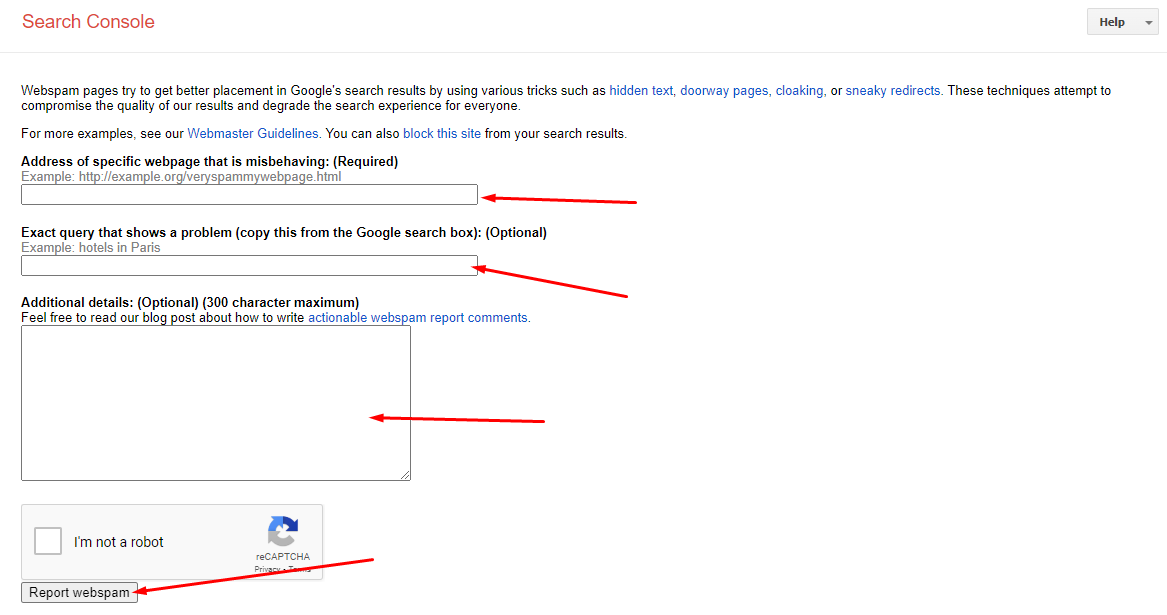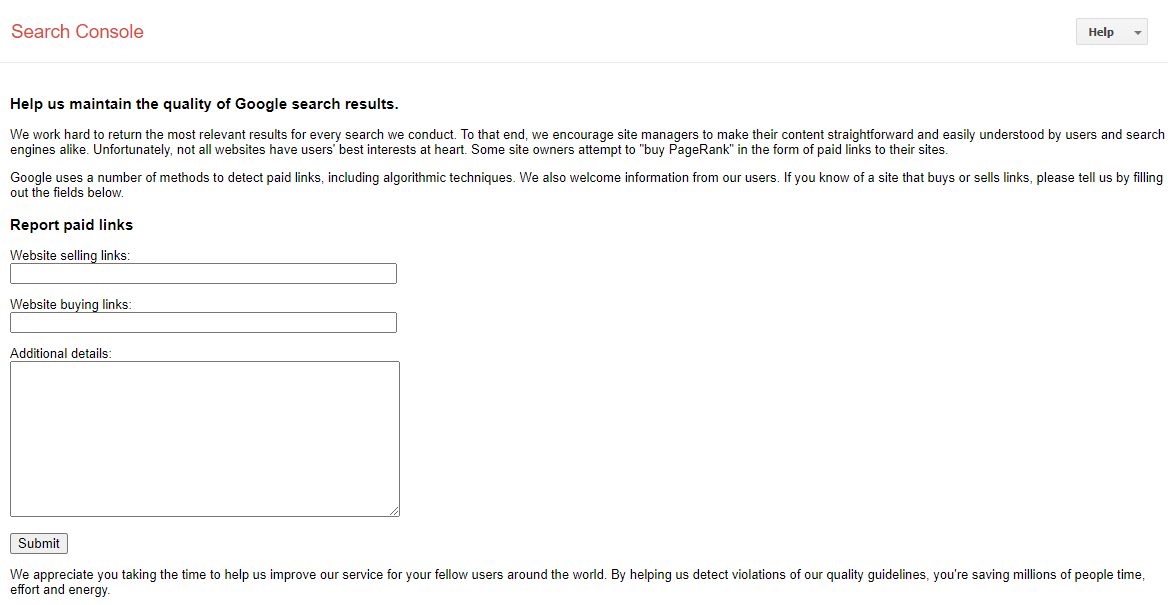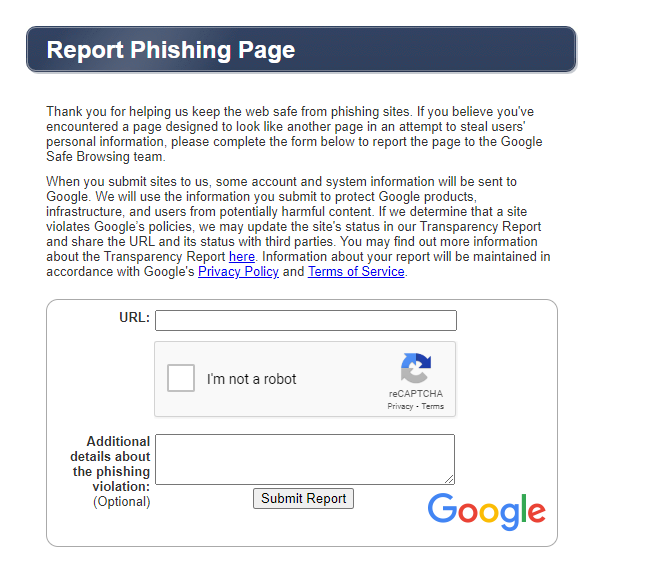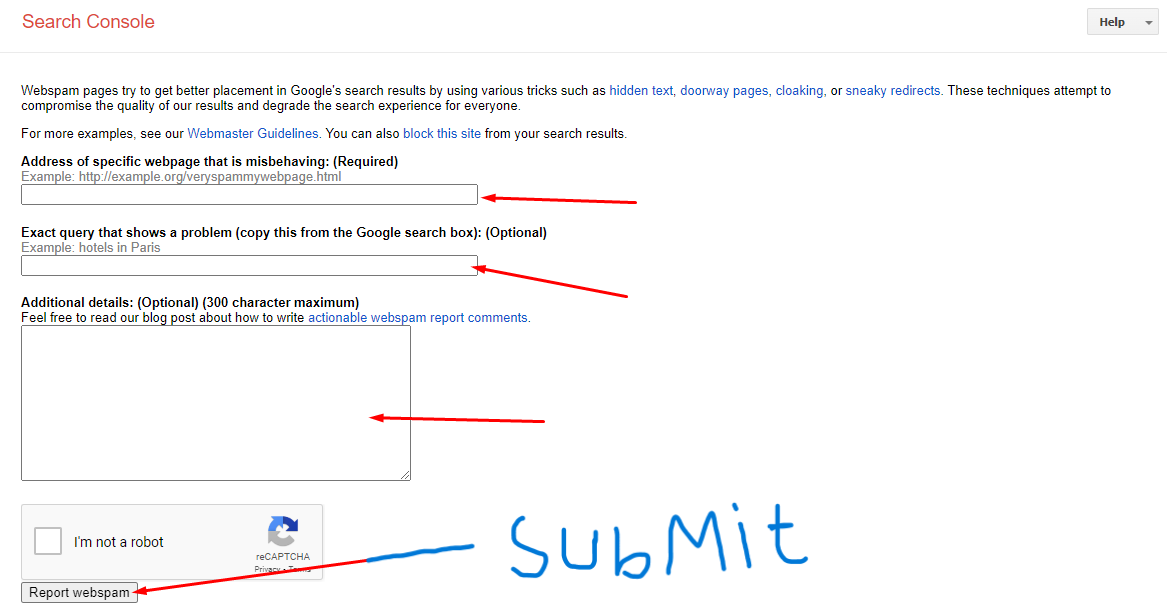Everyone knows how competitive the Internet world is today.
Maximum of the population owns a website and the fight for ranking on the top search result pages is increasing rapidly.
Some people use unethical and illegal SEO techniques to make their websites rank higher in search results and try to beat their competition.
Such unethical SEO techniques are called black-hat SEO techniques.
Whenever you notice your competitors using such unfair black hat SEO tactics, you have to report their website to Google by following the methods below.
How to Report Black Hat SEO to Google?
Let’s take look at a step-by-step guide on how to report such practices to Google.
1. Read And Understand Google’s Webmaster Guidelines Carefully
It is crucial to have a clear understanding of the Webmaster Guidelines before reporting any black hat SEO spam to Google. This can help you:
- Evaluate and assess your own SEO practices.
- Distinguish between white hat and black hat SEO techniques.
- Understand which categories of black hat spam can be reported to Google.
It is important to understand these distinctions before reporting spam to Google, as failing to do so can have negative consequences.
If you have a good understanding of what constitutes black hat SEO practices and come across sites that clearly employ them, you can follow the instructions given in the subsequent steps.
2. Create A List Of Websites That Are Using Blackhat SEO
If you come across websites that are using unethical SEO tactics to manipulate search engine results, either on specific pages or across their entire site, you should compile a list of all the relevant URLs and move on to step 3 by putting them in a spreadsheet.
3. Find The Right Spam Report For A Website
Google has divided spam activities into four distinct categories and has created specific reporting forms for each category.
It is important to correctly identify the relevant category for the spam activity you are reporting and use the corresponding form to submit your report.
The categories include:
Spammy Content
Websites that use deceptive tactics like hidden text, doorway pages, cloaking, and sneaky redirects to manipulate their search engine rankings are categorized as Spammy Content.
These black hat techniques are used to achieve higher positions in Google’s search results.
These techniques can lower the quality of content and diminish the search experience for users. Therefore, Google encourages you to report any spammy content you encounter by using this form.

Paid Links Spam
Google’s rules state that any links included in the content should be placed by the editor and only serve the purpose of providing readers with related and useful information.
However, some SEOs and webmasters engage in buying and selling backlinks to gain the PageRank benefit.
Google considers this to be a link scheme and it can negatively impact the quality of search results. You can report spam related to paid links by filling out this form.

Malware
If you come across a website that appears to be infected with malware or is distributing malicious or unwanted software, it is crucial to report it to Google promptly.
This not only helps protect other users from potentially harmful content but also maintains the integrity of Google’s search results.

Phishing
If you come across a webpage that has been created to look like another site, with the intention of tricking users into giving away their personal information, it may be considered phishing spam. You can report such pages using this form.

4. Provide Specific Details About The Black Hat Techniques Used
After selecting the appropriate category for reporting spam and clicking the corresponding form, you will be directed to a page where you can provide specific information about the spam activity.
For example, if you chose to report Spammy Content, the page will appear like the one shown.
Even though some fields may not be required, it’s important to give Google precise information about the problems by filling out all the relevant details.
5. Submit The Form
After completing the form with all the necessary information, submit it, and you will receive a confirmation screen indicating that the spam report was submitted successfully.
However, please be aware that Google does not typically provide any feedback on the outcome of the report or any actions taken in response to it, so it is not necessary to wait for a response.
It’s important not to become disheartened if you don’t immediately notice any changes in the search results, as it can take Google some time to review the spam reports.
This process may take several days, weeks, or even months before any noticeable differences are apparent.

What Is Black Hat SEO?
Black Hat SEO refers to the use of techniques that manipulate or trick search engine algorithms to achieve higher rankings on search engine results pages.
These techniques are unethical.
A website can be penalized badly by search engines for using such techniques.
The techniques of black hat SEO can include anything from PBNs, Buying Backlinks, doorway pages, and cloaking to keyword stuffing.
Their main purpose is to manipulate search engines into believing that your website deserves a higher ranking in SERPs.
More examples of black hat SEO techniques included hidden text, link wheel, link farming, Content Automation, Sneaky Redirects, Abuse of Structured Data/Rich Snippets, and PBNs that are completely against Google’s official guidelines.
Don’t even think to implement such tactics on your website because doing this will put your website at risk in SERPs.
Google and other search engines are constantly improving their ranking algorithms to fight against such unethical web-pages.
They can make your website de-ranked or even de-indexed in some cases by applying blackhat SEO techniques.
Reporting blackhat is not tough and can be done by anyone with a basic understanding of Google searches.
Blackhat SEO techniques like spamming can be reported on Google’s online report spam page.
On the report spam page, you can select further types of violations like Spammy content, Paid links spam, Malware, and Phishing to be reported.
If you are thinking of your own website, then don’t worry, reporting blackhat SEO of others’ websites will not harm your own website.
You can use the spam reporting services like SpamCoop and StopForumSpam as well.
Types of Black Hat SEO Techniques can be Reported
Some of the most prevalent black hat SEO tactics that are currently in use and which you can report include:
- Cloaking
- Page Swapping
- Doorway pages
- Using invisible text
- Keyword Stuffing
- Content automation
- Publishing spun content
- Creating user-damaging web-pages, such as phishing or installing viruses, or trojans
- Blog comment spamming
- Promoting link schemes
- Posting duplicate content
- Abusing of Structured Data and Rich Snippets
- Posting fraud job listings and scholarships
- Just adding affiliate program links without providing valuable content
- Sending automated queries to Google
Bonus Tips To Report Black Hat SEO to Google
If you want to report someone using black hat techniques to Google, it’s important to remember that they will investigate the matter.
Knowing what to expect from the process can help you make it go more smoothly. Here are a few suggestions for submitting a useful report:
- To increase the chances of your spam report being manually reviewed, provide a comprehensive and practical report with specific details.
- Include as many details as you can about what occurred, and provide ample evidence to support your claims.
- Give a clear account of the actions that occurred and furnish examples of the violations that have taken place.
- Ensure that you report any and all violations of Google’s Webmaster Guidelines.
- Keep in mind that Google is unlikely to provide feedback regarding any action taken in response to your report of white hat techniques, so don’t expect to receive any information on the matter.
- Avoid including excessive and unrelated information that could potentially delay the investigation process.
How Does Black Hat SEO Affect Your Site?
You should be aware that using black hat techniques can have serious consequences, including:
- Affected site authority
- Short-term results
- De-indexing of website
- De-ranking of website
- Penalties
- Blacklisting your server IP Address
- Poor UX
- Inhibited search rankings
If your competitors are using black hat techniques then you will lose your ranking as they will take your place. In this case, we encourage you to report their website to google.
Why you Should Report Websites Using Black Hat SEO Techniques?
Reporting a website that is using black hat SEO techniques is important for several reasons:
- Improving the internet: Such websites are associated with spam, low-quality content, poor user experience, and wrong and misleading information that destroys user experience for the internet users. By reporting websites using black hat SEO techniques, you are helping to create better internet quality.
- Maintaining fairness: Reporting black hat SEO websites helps to maintain fairness and promotes healthy competition in Google.
- Upholding search engine guidelines: Search engines like Google have strict guidelines that websites must follow to ensure that they are providing high-quality, relevant content to users. Reporting websites that violate these guidelines helps to maintain the integrity of search results.
- Protecting users: Black hat SEO techniques often involve deceiving users by providing them with low-quality content or leading them to dangerous websites. Reporting these websites can protect users from falling victim to scams or viruses.
Some Commonly Used Black Hat SEO Techniques
Let’s take a closer look at some examples of black hat SEO and the most commonly used techniques.
HIDDEN TEXT
An example of a black hat SEO technique is using white text on a white background or setting the font size to zero.
This technique hides the text from users but not from search engines, and is used to stuff pages with too many keywords in an attempt to boost rankings.
However, this practice can actually harm SEO efforts instead of helping them.
CLOAKING
Cloaking is a dishonest technique used to manipulate search engine rankings by displaying different content or URLs to search engines than what is shown to actual users.
It’s an attempt to deceive search engines by presenting false information, which can harm the user experience and compromise the integrity of search results.
KEYWORD STUFFING
Keyword stuffing is a technique where content is overloaded with the same keyword in an attempt to rank higher in search results.
This approach used to be effective in the past but is no longer successful due to advancements in Google’s algorithms.
PAID LINKS
Trying to quickly improve your website’s authority and ranking by purchasing backlinks is not a sustainable strategy.
This practice, known as a link scheme, is frowned upon by Google and can result in penalties for your site.
DOORWAY PAGES
Doorway pages are created with the intention of ranking for specific search queries and redirecting users to the same destination.
This is done by creating multiple domains or pages that target regions where a business doesn’t operate, solely for the purpose of redirecting traffic to the target page.
MANIPULATIVE REDIRECTS
Using redirects for legitimate reasons such as preparing for a site migration, consolidating content, or indicating that a page no longer exists is acceptable.
However, if the purpose of the redirect is to trick users by sending them to a different page than the one they expected from the search results, it is considered a black hat tactic.
NEGATIVE SEO
Negative SEO is an unethical and malicious technique that goes beyond black hat SEO practices.
In this technique, the practitioner does not try to improve their own website’s ranking, but rather tries to harm their competitors by launching negative SEO attacks against their sites.
To illustrate, a harmful practice is to flood rival websites with low-quality links and fake negative reviews, or even carry out aggressive tactics such as hacking their site.
Therefore, it is important to regularly review your website’s backlinks to make sure they are not spammy.
AI CONTENT/ARTICLE SPINNING
Producing high-quality content requires a significant investment of time and effort.
As a result, some black hat SEO practitioners use software that rewrites the original article in order to generate multiple unique pieces of content.
They then publish these articles on low-quality websites in order to obtain backlinks.
However, the backlinks acquired from these sites rarely provide any link juice, which can actually harm your ranking instead of improving it.
EXACT MATCH DOMAIN (EMD)
EMD stands for Exact Match Domain, which means using a domain name that precisely matches the keywords you want to rank for.
For instance, selecting domain names like healthinsurance.com or roofingservices.com.
Although it’s not considered unethical, using an exact match domain can increase the likelihood of your site being penalized by Google.
This is because it can lead to more backlinks with anchor text that exactly matches your domain and overuse of the targeted keywords on your landing pages, which are both practices that can trigger penalties from Google.
PHISHING
These are fraudulent pages that aim to steal users’ confidential information.
They are deliberately crafted to resemble the pages of well-known and reliable sites, with the goal of tricking users into trusting them and divulging their personal details.
COPYING COMPETITOR’S DOMAIN NAME
Certain unethical individuals, known as “black hat” practitioners, may resort to deceptive methods such as purchasing a domain name that is very similar to that of a well-known competitor.
Their goal is to appear in search results for the competitor’s branded keywords and redirect their traffic toward their own website.
On the other hand, attempting to do so may end up causing you more difficulties than benefits, as you may potentially face accusations of violating trademark laws and be forced to pay substantial penalties as a result.
Why Should you Avoid Black Hat SEO Techniques?
Here are some reasons why you should avoid using black hat SEO techniques:
GOOGLE PENALTIES
When you break Google’s webmaster guidelines, you risk getting penalized by Google, which may result in lower rankings or even removal from Google’s search index.
POOR USER EXPERIENCE
Providing a good user experience is very important for Google, and using black hat SEO techniques can harm the user experience on your website.
This can lead to users leaving your site quickly, which is a negative signal to Google.
As a result, your website’s rankings, traffic, leads, and conversions can all be negatively impacted.
If you’re uncertain whether your SEO tactics are following Google’s guidelines, you can enlist the help of professional SEO services to assess your website and ensure it adheres to white hat SEO practices.
NO LONG-TERM RESULTS
Although black hat tactics may offer quick gains in the short term, they are not sustainable in the long run.
Google may take time to detect if a website is using black hat tactics. So while these tactics may initially manipulate the algorithms and boost rankings, eventually Google will catch on, and the website’s rankings and traffic will drop.
What Occurs After You Report Black Hat SEO to Google?
Black hat SEO can result in several outcomes, the most probable being that the search engine takes action against the website in question.
The consequences may range from lower rankings to complete removal from the search index.
Depending on the severity of the wrongdoing, the website owner may also face penalties. Alternatively, nothing may happen at all.
If the black hat tactics are widespread and well-concealed, search engines may not detect them, or they may not be deemed significant enough to warrant action.
Regardless of the outcome, it’s crucial to keep in mind that reporting such behavior can prevent unscrupulous individuals from getting away with such tactics.
If you encounter any dubious activity online, take action immediately and report it!
Impact Of Reporting Black Hat SEO
We all know that black hat SEO techniques can cause significant harm to websites.
However, if you want to take action against it, reporting such tactics to search engines like Google can be a crucial step in enhancing the entire web environment.
Let’s explore how this process works and the potential impact of reporting.
When you notify Google about black hat SEO practices, they take your report seriously and conduct an investigation.
If they confirm the use of such practices, they will impose penalties on the website responsible.
As a consequence, the website’s ranking may decrease, or it may even be completely removed from Google’s search results.
Furthermore, those who engage in such practices may receive warnings or face legal consequences.
Reporting black hat SEO isn’t only advantageous for website owners who want to safeguard their sites against unethical individuals but also for genuine businesses who want to guarantee that their sites are not harmed by such practices.
By combatting such practices, we can ensure a safe and effective environment for everyone on the internet.
It’s our responsibility to take action and protect ourselves and others from harm.
Therefore, let’s all play our part in maintaining a secure web!
Why Should you Report Black Hat Spam?
Consider this from a business standpoint: If your main way of gaining customers is through organic traffic, it’s important to aid Google in enhancing the excellence of search results.
In addition, if a website using black hat techniques appears in the search results, it may not provide the best quality information to users, including your target audience.
This is because these sites may rank higher than sites with quality content.
Moreover, it’s important for business owners to encourage fair competition.
By reporting instances of black hat spam to Google, you can assist in creating a fair and level playing field for all webmasters.
This ensures that no website has an unfair advantage over others.
However, it’s crucial to remember that this reporting feature should not be misused to report competitors who follow Google’s guidelines (known as white hat SEO techniques) simply because you are unable to outperform them.
Doing so is comparable to a negative SEO attack, which we discussed earlier.
Can white-hat SEO be considered safer than black-hat SEO?
In short, the answer is yes. The reason is that these practices are made up of various techniques, and understanding each concept will help clarify the differences between them.
- White hat SEO means using techniques and strategies that focus on real people and completely adhere to the terms and conditions set by search engines.
- Black hat SEO refers to techniques that go against the rules and guidelines set by search engines, and are generally considered unethical. These tactics do not benefit searchers and are not recommended for use.
What steps should you take if your website has been reported for black hat SEO?
If your website is reported for using black hat SEO, it’s crucial to act swiftly to prevent the issue from causing further damage to your website’s reputation.
Ignoring the problem and hoping it will go away on its own can make the situation worse and even result in legal consequences. So, what steps should you take?
To start with, it’s crucial to evaluate the situation and determine why your site was reported for black hat SEO.
It’s likely that someone might be intentionally harming your website or a competitor is attempting to gain an unfair advantage.
In case you have a suspicion about the culprit, consider reaching out to them and requesting an explanation.
This could help in resolving the problem without requiring any further action.
If it turns out that you’ve been using black hat SEO techniques, you must act quickly to fix the issue.
Remove any problematic content from your website and review your SEO practices to ensure they are in line with industry standards.
Fixing black hat SEO practices can be a difficult and time-consuming task that may require resources some businesses don’t have in abundance.
However, delaying this process could lead to irreparable harm to your brand reputation and even hefty penalties from search engines or regulatory bodies.
Is black hat SEO unethical?
Yes, black hat SEO is considered unethical because it involves tactics that are against Google’s guidelines.
Blackhat SEO tactics like Cloaking, Sneaky Redirects, Poor Quality Content, Paid Links, Link Farms, Keyword Stuffing, and spammy Blog Commenting, are completely unethical.
What are the penalties for black hat SEO?
If you use black hat SEO tactics on your website and Google finds out, they may penalize you.
After acknowledging a black hat SEO tactic, Google will update its algorithm accordingly and penalize your website badly.
This penalty could lead to your website’s rank dropping or, in extreme cases, being permanently removed from Google’s search results. So it’s important to avoid black hat SEO techniques to ensure your website’s ranking and visibility on Google.
The following are penalties mentioned that can get for using black hat SEO tactics:
- Ranking Down
- Website Deindex
- Ranking shuffling every time you check the rankings of your website
- Blacklisting IP Addresses of website
- The website will be indexed but still disappeared from search results.
Is black hat SEO illegal?
The short answer is: it depends. Not all black hat SEO tactics are fully illegal, but if they violate webmaster guidelines, they could be penalized by search engines like Google.
Black hat SEO technique: Serving one page to users, and another to search engines.
Clocking is a black hat SEO technique that uses 2 different versions of pages.
One version is designed to provide a better user experience for the user, while the second hidden page is optimized using black hat SEO techniques such as keyword stuffing and spammy content to target a specific keyword for search engines.
Can I report black hat SEO on behalf of someone else?
Yes, you can report black hat SEO on behalf of someone else if you have their permission and the necessary information to file a report.
Will I receive a response from Google after filing a spam report?
No, Google does not provide a response to spam reports, nor do they disclose the results of their investigations.
But, you can check on your behalf if a website has been penalized or removed from the search results by performing a search for it on Google.
Can I report my competitors for using black hat SEO?
Yes, you can report your competitors for using black hat SEO if you have evidence to support your claim.
However, you should not file a report based on suspicion or personal grudges.
Is it safe to report black hat SEO to Google?
Yes, it is completely safe to report black hat SEO to Google.
Google always encourages users to report any spam or black hat SEO practices they come across on the internet, and it takes measures to protect the privacy of the reporter.
Get Ethical and Legal SEO Services from SEO Cares.
The SEO professional team of SEO Cares always follows the webmaster’s guidelines and performs white hat SEO techniques.
You can try our SEO services to bring your website to the top of the SERPs in a short time.
Being a reliable SEO agency we provide long-term results. Contact us now to book a consultation.


